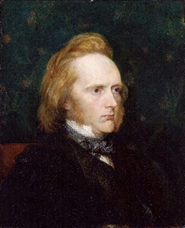George John Douglas Campbell, 8th Duke of Argyll
1823-1900
Styled Marquess of Lorne until 1847, he was a Scottish peer and Liberal politician. He made a significant geological discovery in the 1850s when his tenant found fossilized leaves embedded among basalt lava on the Island of Mull. He also helped to popularize ornithology and was one of the first to give a detailed account of the principles of bird flight in the hopes of advancing artificial aerial navigation. Argyll was born at Ardencaple Castle, Dunbartonshire, the second but only surviving son of John Campbell, 7th Duke of Argyll, and his second wife Joan Glassel, the only daughter of John Glassel. Argyll succeeded his father as duke in 1847 and became hereditary Master of the Household of Scotland and Sheriff of Argyllshire. A close associate of Prince Albert, he served as Lord Privy Seal between 1852 and 1855 in the cabinet of Lord Aberdeen, and then as Postmaster General between 1855 and 1858 in Lord Palmerston's first cabinet. He was again Lord Privy Seal between 1859 and 1866 in the second Palmerston administration, and then under Lord Russell's second administration, in which position he was notable as a strong advocate of the Northern cause in the American Civil War. Argyll was a major catalyst of the Education (Scotland) Act of 1872 which made primary school education mandatory for children aged between 5 and 13. In Gladstone's first government of 1868 to 1874, Argyll became Secretary of State for India, in which role his refusal to promise support against the Russians to the Emir of Afghanistan helped lead to the Second Afghan War. In 1871, his son and heir, Lord Lorne, married one of Queen Victoria's daughters, Princess Louise. In 1880 he again served under Gladstone, as Lord Privy Seal, but resigned on 31 March 1881 in protest at Gladstone's Land Bill, claiming it would interfere with the rights of landlords and had been introduced in response to terrorism. In 1886, he fully broke with Gladstone over the question of the Prime Minister's support for Irish Home Rule, although he did not join the Liberal Unionist Party, but pursued an independent course. In 1892 he was created Duke of Argyll in the Peerage of the United Kingdom. Argyll was also an amateur scientist dedicated to many areas of science. Aside from his own work in ornithology, he wrote on anthropology, evolution, glaciology and economics. He was a leader in the scholarly opposition against Darwinism; although he was not against the theory of evolution, Argyll argued instead for theistic evolution. He did argue against the erosive capability of glaciers.
